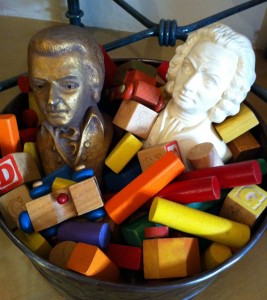Playing With Wolfgang
 No one was more surprised than I when I conceived of the Menuetto to my Mozart Sonata as a heated discussion between a married couple. When I talked about it, my musical friends gave me funny smiles and quickly began to discuss the weather. I second guessed myself while driving to school and decided that it had been something in the water. But, when I returned to the keyboard, there it was again—an argument plain and simple.
No one was more surprised than I when I conceived of the Menuetto to my Mozart Sonata as a heated discussion between a married couple. When I talked about it, my musical friends gave me funny smiles and quickly began to discuss the weather. I second guessed myself while driving to school and decided that it had been something in the water. But, when I returned to the keyboard, there it was again—an argument plain and simple.
I was preparing the Sonata in A K. 331 for a performance and the supposedly simplest movement was giving me the most interpretive headaches. The Menuetto was simply not cutting it. I couldn’t get a handle on it. It seemed all broken into bits and I couldn’t connect the bits or make it work as more fragmented thoughts. And what was up with the Beethoven like dynamics?
I listened to as many performances of the piece as I could get my hands on and then expanded to Mozart symphonies and of course opera. No immediate insights. Then, one night I woke up at something like 3:30 a.m. and was suddenly hearing the Menuetto as opera. Specifically as the aforementioned argument.
When I got to the piano later that morning (unfortunately children and a husband would have strenuously objected to my need to play it at 3:30 a.m. ah, irony…), the Menuetto held together and made absolute sense to me. I recorded it and listened. It still made sense. It was demanding, placating, submissive, wily, whiney, nagging, insistent, and more. The trio was harmonious and loving and the opposite of all the above. And, of course, all this fits like a glove with the themes in Mozart’s operas.
The surprise of that discovery has remained with me. Perhaps I had to be 40 and married with children to receive it or perhaps it was the water. In any case, I was and am grateful for the insight.
Introducing (ta-da) Playing With Wolfgang
Have you had a surprising insight that changed you and your playing? Do you have links to performances or information that you would like to share? Do you have a great story to tell? Well today, I’m introducing a new Piano Addict Feature: Playing With Wolfgang. The plan is to feature a different composer approximately every month.
I was inspired by a blog called Tuesdays With Dorie in which everyone makes the same recipe and then shares pictures and recounts their experiences of the process. I thought- why can’t we do that with piano music? So, I am inviting (OK begging) you to share your, recordings, links to articles and resources, images, personal stories, and questions in the comment section of each post. And, since we are all busy with our various careers and professional commitments, I decided to broaden the scope and include all piano works by a single composer and invite you all to share more than just playing experiences.
So, please feel free to share links, teaching learning & playing experiences, images, sound & video files, and anything else you feel is in the scope of each month’s topic. In order to share images or videos you will need to include a link to a service such as YouTube, SoundCloud, or Flicker in your comment. Of course, you may also comment on the Piano Addict Facebook Page, but not everyone will get the benefit of your contribution that way. Please keep your comments on topic, which this month is all things Mozart.
Are you in??? Press the comment button and start sharing! (you know you want to)



In case any of you haven’t been to Wayne’s website, check out helping kids learn with Mozart
Well I am back – good to see Robert responded to my invitation to comment here – I think, as a relatively new blogger, that stirring up some interviews and conversations is a great inspiration to continue posting – out of the vacuum and into the rich warm air of communications.
Now to visit Robert’s blog.
Wayne
Thanks all for the kind comments…I guess there may be life in the old blog yet .
Nothing is forever, and in the intervening time I’ve done more listening and thinking. Mozart operas now rank quite high on my listening list, although nothing will knock Wagner from the top spot.
Yes, the formulaic side is a stretch, but I still think it has some merit. Getting to my day job, the parallels between how Homer used to be viewed (all formulaic) and people having problems with Mozart in terms of formulae are…strong. Homeric studies doesn’t view it as mechanical anymore, and some musicians don’t view Mozart that was; Charles Rosen comes to mind, of course.
But I think the biggest problem is that…we’re not used to hearing formulae, just like we’re not used to hearing the fortepiano. But that is another story….
%%robert
Well Robert, as old as that post was, it wrung a new comment out of me at least. 🙂
Great point! In a concert/recital we don’t hear one piece in a vacuum. Each piece contrasts with or informs the others. Very cool.
Browse away… and thanks for the link. I need to ponder the formulaic idea you put forth. I think this has a lot to do with INATN which I have talked about on this here blog before–that there is a point (earlier than one might imagine) at which study has to evolve to where “it’s not about the notes.” You are right about damage. I am the Queen of the Transfer Students and see a lot of it. Some never recover.
Glad to be exciting and to have the benefit of your wisdom as the man for Mozart! Yes! Conversation is the ticket:)
Hi Wayne,
Thanks for the Twitter invite to be here. Very nice idea you have. Very nice site too — I know the theme you’re using, and you’ve done a fine job tweaking it. Aphula has never looked so good.
I’m attaching a link to a Mozart post I wrote a few years ago on my Blogger piano blog. I still think it’s pretty good, so I’m giving the link below. The site has been inactive of late; but I just may get active again there, depending on feedback. So please, feel free to look around and give opinions (same for anyone else reading this!).
Without further ado:
http://oparp.blogspot.com/2006/06/mozart-is-his-own-worst-enemy.html
I’m looking forward to browsing your site later today!
%%robert
Such is my life that coming upon this piece of writing actually approached the category of ‘exciting’ – I am on a time framework now, coffee is brewing and I can only say I am glad to find this and will return. Faving the link.
Such a blogpost suggests a conversation -many people gathered in this here room all around the topics you bring up – I’m taking away some ideas, mulling and musing and will be back. Meanwhile, I’ll send the link to others.
Wayne
p.s. Talking points from your post include:
‘I listened to as many performances of the piece as I could get my hands on and then expanded to Mozart symphonies and of course opera.’ and
‘…suddenly hearing the Menuetto as opera…’ HOW WONDROUS! I hear each of the 51 movements of the piano Sonatas as opera, concerto, symphony, quartet, duet, always…such drama within such economic means…Oh Mozart, next to God you are the best Creator ever!
Wayne
I saw this at the Alex Theater a while back. Was FABULOUS … and yes, the Mozart stuff sounded like a back and forth to me as well. His stuff always does. At the time when I was in the audience it hit me that it was like watching someone who could run very fast having a tennis match with himself:
*thock!*
*dash!*
*thock!*
*dash!*
Mozart can be fun that way. 🙂
The Haydn in particular was really good … and incredibly cool to hear it immediately after Lutoslawski of all things. Not my favorite type of music, but it did change the way I heard the Haydn.